Research
Infographic
Recognizing Faculty with Disabilities: Data and Considerations from the Faculty Job Satisfaction Survey
Drawing upon Faculty Job Satisfaction Survey data from 2019 and 2020, this piece examines meaningful differences in perception of the academic workplace between faculty with visible disabilities, invisible disabilities, and no reported disabilities.
Case Study
Supporting the Next Generation of Faculty at Georgia State University
In this partner spotlight, Georgia State University shares how the institution applied its data-driven approach to student success to the faculty experience through the administration and rollout of the Faculty Job Satisfaction Survey.
Webinar
Success After Tenure: Lessons in Engaging Mid-Career Faculty
Based on the 2018 book, Success After Tenure: Supporting Mid-Career Faculty (Stylus), this webinar highlights the impetus behind compiling the volume, as well as the successful practices put in place by COACHE partners at Rochester Institute of Technology.
Browse Resources By Topic
- Career Path
- Faculty Development & Support
- Diversity, Equity, & Inclusion
- Higher Education Leadership
- Recruitment & Retention
- Work Life Balance
Is the Tenure Process Fair? What Faculty Think
Citation:
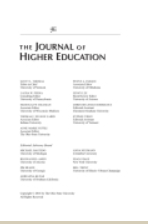
Abstract:
A conceptual framework grounded on procedural justice theory was created to explain how judgments about the fairness of tenure decision-making evolved among faculty who had not yet undergone the review. The framework posits that faculty beliefs about fairness are influenced directly by their workplace experiences and both directly and indirectly by their socio-demographic characteristics.
Structural equation modeling was used to assess the proposed effects with data from 2,247 pre-tenure assistant professors at 21 research universities. The results substantiate the importance of perceived campus and department conditions.
Equitable treatment of junior faculty at the department level and effectiveness of feedback have the strongest relationships with beliefs about the equity of tenure decision-making. An individual’s sense of control during the process of constructing the tenure dossier predicts his or her judgments about the fairness of tenure reviews. Practical suggestions for campus leaders and implications for future research are discussed.
An analysis of job satisfaction among Millennial faculty at southeastern colleges and universities
Citation:
Thesis Type:
DissertationAbstract:
Millennials will dominate the global workplace as the prominent generational cohort by 2020. This projection surfaces considerations for recruitment and succession planning within higher education.
This study investigated how Millennials’ workplace preferences impact faculty job satisfaction. The research inquiry was launched utilizing institutional data from four-year public and private institutions in the Southeast to assess the relationship between overall job satisfaction and mentoring satisfaction, and to compare Millennial faculty job satisfaction to senior generations. The study uses Faculty Job Satisfaction Survey data.
From the analysis of 9,496 faculty responses, the study produced statistically significant outcomes that addressed the research inquiry. The outcome of the investigation signals a strong correlation between the impacts of mentoring satisfaction and the overall job satisfaction of Millennial faculty. Pragmatic talent management and organizational development strategies are recommended to assist institutions in leveraging the power of the multi-generational workforce to attract and retain Millennial faculty.
Effects of generation on tenure-track faculty satisfaction
Citation:
Thesis Type:
DissertationAbstract:
The academy is generationally diversifying as Baby Boomer faculty members move into retirement and younger faculty enter the workforce. Understanding and addressing generational differences is increasingly important, as employees across a broad age range will be working together.
This quantitative study explored the effects of generation on tenure-track faculty job satisfaction. Aside from obtaining a generational snapshot of tenure-track faculty, this study sought to determine if generation could predict job satisfaction indices. Multiple regression analyses were conducted on variables obtained from a pre-existing aggregated Faculty Job Satisfaction Survey dataset. Statistically significant demographic effects emerged in seven job satisfaction indices, but multiple regression results provided little evidence to suggest demographic variables, which have frequently been used to explain differences between groups, are strong predictors of tenure-track faculty satisfaction. These findings raise questions about the credibility of claims by generational practitioners and consultants and signify that more research is needed.
Evidence-Based Faculty Development: The COACHE Research-Practice Partnership
Citation:
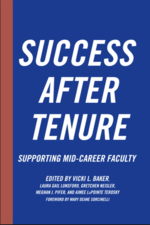
Abstract:
This book brings together leading practitioners and scholars engaged in professional development programming for and research on mid-career faculty members, those tasked with being the next generation of faculty leaders and mentors on their respective campuses, with little to no supports to do so effectively.
The stories, data, and resources shared in this book will provide inspiration—and reality checks—to administrators, faculty developers, and department chairs charged with supporting their faculties as they engage in academic work. Topics include faculty development for formal and informal leadership roles; strategies to support professional growth; teaching and learning as a form of scholarship; and strategies to recruit, retain, and promote underrepresented faculty populations.
While the authors acknowledge that mid-career faculty members face numerous challenges, this collection offers a counter narrative by looking at ways that faculty and/or institutions can assert themselves to find opportunities within challenging contexts.
Gender and Race Differences in Faculty Assessment of Tenure Clarity: The Influence of Departmental Relationships and Practices
Citation:
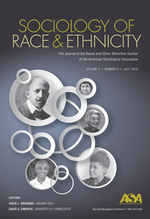
Abstract:
The authors look at how the intersection of gender and race influences pre-tenure faculty members’ perceptions of the clarity of tenure expectations. The authors also seek to identify potential predictors (assessment of mentoring, relationships with peers, feedback on progress toward tenure, and fairness in tenure decision making and evaluation) of perceptions of tenure clarity for four intersectionally defined groups, including historically underrepresented minority women (URMW). The authors use an intersectional perspective and the gendered and racialized organizations’ theoretical lens to interpret the results. The data set comes from the Faculty Job Satisfaction Survey. Findings show that compared with white men, URMW are less satisfied with their relationships with peers and with the fairness in the evaluation of their work. They are also less likely to agree that mentoring is effective, that tenure decisions are fair, and that messages about tenure are consistent.Building a Better Exit Study: A National Effort to Understand Faculty Retention & Turnover
Citation:
Abstract:
In 2016, COACHE partnered with the University of California System to pilot our newest undertaking -- the Faculty Retenion and Exit Survey. This survey is the only multi-institutional study of faculty retention and exit, and examines the costs, conduct, and causes of faculty turnover.
In this webinar, Kiernan Mathews and Todd Benson describe how the survey came to be, and outline some of the initial findings from the pilot study along with some practical recommendations for Academic Affairs administrators.
Perspectives on What Pre-Tenure Faculty Want and What Six Research Universities Provide
Citation:
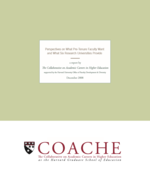
Abstract:
COACHE released this report in conjunction with the Harvard University Office for Faculty Diversity & Development. It is the result of many months of mining and synthesizing the information collected from nearly 80 interviews with pre-tenure and tenured faculty, department chairs, and senior administrators at six COACHE member campuses. Much of what is contained in this report may be all too familiar to an experienced academic administrator, but it is the first time the experiences of early-career faculty and the faculty development policies of top-tier research universities have been assembled in one place.- «
- 5 of 5
Revealing Data on Faculty Retention & Departure
Citation:
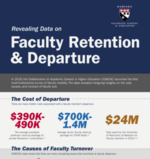
Abstract:
In 2017, after a successful pilot with several campuses of a large public university system, COACHE launched the Faculty Retention and Exit Survey nationwide. This study represents the first multi-institutional survey of faculty retentions (among those with outside offers) and departures. Until now, there was no coordinated effort for universities to develop a common understanding of the causes, costs, and conduct of faculty mobility.
Among the takeaways: More than half of faculty ranked salary as a secondary factor or not a factor in their decision to stay or leave. But 67% selected quality of colleagues as a compelling factor. The study also found that faculty are expected to cultivate outside offers before they can ask for a better deal at home, and that this requirement pushes them out the door: nearly 1 in 3 faculty who left originally sought the offer only to renegotiate the terms of their employment.
Full Text

College nursing faculty job satisfaction and retention: A national perspective
Citation:
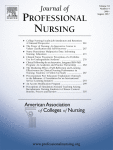
Abstract:
The need for registered nurses in the United States continues to grow. To meet this need for increased numbers of nurses, recruitment and retention of qualified nurse educators has become a priority, and job satisfaction and nursing faculties’ intent to stay have emerged as important considerations for administrators.
The purpose of this study is to analyze variables of relationships with nurse faculty job satisfaction and intent to stay from data collected throughout the United States. The Faculty Job Satisfaction Survey was employed for the purposes of this study. Over 1,350 nurse educators were included in the survey. The findings support a variety of modifiable variables that are viewed as important by nursing faculty. The strongest relationship was found to be institutional leadership. The implications can inform academic administrators seeking to retain nursing faculty.
Academic nursing administrators' workplace satisfaction and intent to stay
Citation:
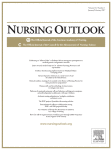
Abstract:
Correlates of Work-Life Balance for Faculty Across Racial/Ethnic Groups
Citation:
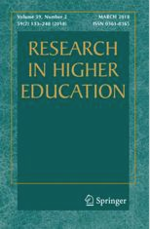
Abstract:
Very few studies have examined issues of work-life balance among faculty of different racial/ethnic backgrounds. Utilizing data from the Faculty Job Satisfaction Survey, this study examined predictors of work-life balance for 2,953 faculty members from 69 institutions. The predictors of work-life balance included faculty characteristics, departmental/institutional characteristics and support, and faculty satisfaction with work. While African American women faculty reported less work-life balance than African American men, the reverse was true for Latina/o faculty. In addition, White faculty who were single with no children were significantly less likely to report having work-life balance than their married counterparts with children. Faculty rank was a significant positive predictor of work-life balance for all faculty. Notably, the findings highlight the importance of department and institutional support for making personal/family obligations and an academic career compatible. In addition, satisfaction with time spent on research had positive associations with work-life balance for all faculty.
Reasonableness and clarity of tenure expectations: Gender and race differences in faculty perceptions.
Citation:
Abstract:
This dissertation studies how higher education policies and practices can affect faculty retention and proposes changes that higher education institutions need to make to retain their faculty. The first manuscript investigates the reasonableness of tenure expectations as it relates to work-life balance, the second explores whether women’s and men’s assessments of tenure-related departmental practices influence their perceptions of clarity of tenure expectations, and the third looks at how the intersection of gender and race influences faculty perceptions of clarity of tenure expectations. The dissertation uses Faculty Job Satisfaction Survey data from a sample of 2,438 tenure-track assistant professors at research universities.
Understanding the changing faculty workforce in higher education: A comparison of non-tenure track and tenure line experiences
Citation:

Abstract:
Non-tenure track faculty are a growing majority in American higher education, but research examining their work lives is limited. Moreover, the theoretical frameworks commonly used by scholars have been critiqued for reliance on ideologically charged assumptions. Using a conceptual model developed from Hackman and Oldham’s (1980) Job Characteristics Model (JCM) and prior research on faculty workplace experiences, this study considers the extent to which full-time non-tenure track and tenure line faculty share a professionalized approach to their jobs, working conditions, and how this is associated with their organizational commitment.
Satisfaction with resources, rewards, autonomy and feedback had a significant positive relationship with odds of organizational commitment for all faculty groups. Overall, the results suggest being removed from the tenure track is not associated with faculty viewing their jobs in a substantially different way than those in tenure line positions, which underscores the importance of conceptualizing full-time faculty work as an integrated whole.
Gender and Race Differences in Faculty Assessment of Tenure Clarity: The Influence of Departmental Relationships and Practices
Citation:

Abstract:
The authors look at how the intersection of gender and race influences pre-tenure faculty members’ perceptions of the clarity of tenure expectations. The authors also seek to identify potential predictors (assessment of mentoring, relationships with peers, feedback on progress toward tenure, and fairness in tenure decision making and evaluation) of perceptions of tenure clarity for four intersectionally defined groups, including historically underrepresented minority women (URMW). The authors use an intersectional perspective and the gendered and racialized organizations’ theoretical lens to interpret the results. The data set comes from the Faculty Job Satisfaction Survey. Findings show that compared with white men, URMW are less satisfied with their relationships with peers and with the fairness in the evaluation of their work. They are also less likely to agree that mentoring is effective, that tenure decisions are fair, and that messages about tenure are consistent.International Faculty Perceptions of Departmental Climate and Workplace Satisfaction
Citation:
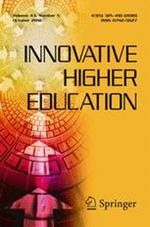
Abstract:
Although the variability in the definitions and immigration status of international academics makes it challenging to provide the exact number of foreign-born faculty members teaching and conducting research in U.S. postsecondary institutions, all data accounts have pointed to a steady growth in this segment of the professoriate. This study used data from the 2011-2014 Faculty Job Satisfaction Survey to examine international faculty members’ satisfaction with autonomy, interactions with colleagues, departmental climate, and recognition and the effect of these elements upon the overall workplace satisfaction of international faculty members relative to their U.S. citizen peers.
This study helps identify factors that can enhance international faculty members’ satisfaction in order to aid institutions in their efforts not only to recruit the best talent but also to support and retain such talent.
Climate Change: Creating Space for Interdepartmental Problem Solving at Skidmore College
Citation:
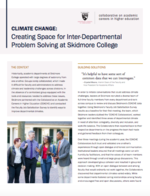
Abstract:
Historically, academic departments at Skidmore College operated with large degrees of autonomy from one another. Groups rarely collaborated, which made it difficult for faculty and administrators to address climate and leadership challenges across divisions. In the absence of a centralized group equipped with the tools and resources needed to address these issues, Skidmore partnered with the Collaborative on Academic Careers in Higher Education (COACHE) and conducted the Faculty Job Satisfaction Survey to identify ways to improve departmental climates.
Using Skidmore’s survey results as a baseline for their first meeting, the team, which Skidmore leaders dubbed the ‘COACHE Collaborators’, worked together to identify three areas of departmental climate in need of attention: collegiality, diversity and inclusion, and work-life balance.
Browse Resources by Faculty Type
Family policies and institutional satisfaction: An intersectional analysis of tenure-track faculty
Citation:
Thesis Type:
DissertationAbstract:
Guided by an intersectional perspective, this study compares responses to the 2008 and 2009 Tenure-Track Faculty Job Satisfaction survey provided by four groups of faculty: African American women, African American men as well as white women and white men. The study examines faculty perceptions regarding the importance of family policies as related to career success, the effectiveness of family policies at the institution, and the level of satisfaction with work-life balance. The findings indicate that there are significant differences in policy perceptions and work-life satisfaction. African American women overwhelmingly indicate that eldercare policy is important to career success, while white women are more concerned with childcare policy. Significant group differences emerge in faculty assessment of childcare policy. The analysis reveals institutional-level support for care work influences overall satisfaction with the institution more than departmental support. The findings suggest care work still matters in relation to a faculty member's career advancement.
Intent to leave the professoriate: The relationship between race/ethnicity and job satisfaction for pre-tenured professors in doctorate-granting universities
Citation:
Thesis Type:
DissertationAbstract:
This study investigated pre-tenure faculty satisfaction and intent to leave their institution using 2005–2008 data from the Faculty Job Satisfaction Survey. The purpose of this study is to identify salient variables influencing faculty of color retention and to explain the lack of progress in diversifying the professoriate by exploring the relationship between racial/ethnic group membership and pre-tenure faculty job satisfaction and the relationship these variables have with departure intentions. The study was limited to faculty working at doctorate-granting U.S. universities.
Results of the study suggest faculty of color are more likely to intend to leave their institutions than their White (non-Hispanic) counterparts. Specifically, the study's findings suggest satisfaction with tenure processes and procedures, teaching, advising, service, and research expectations, and collegiality negatively influenced departure intentions of pre-tenure faculty overall and for specific racial/ethnic groups. The study offers ideas for expanded research on pre-tenure faculty job satisfaction and intent to leave.
Career Stage Differences in Pre-Tenure Track Faculty Perceptions of Professional and Personal Relationships with Colleagues
Citation:
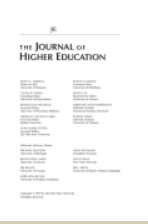
Abstract:
Despite a steady decline in available faculty tenure-track positions, future vacancies in tenure-track positions provide opportunities to diversify faculty ranks with new female faculty and faculty of color. This impending employment shift in faculty demographics may change departmental climates, pre-tenure faculty socialization processes, and professional and personal relationships between pre-tenure female faculty and faculty of color and their colleagues.
This study examines pre-tenure faculty members' perception of collegial relationships with colleagues. We primarily focus on the organizational socialization of female faculty and faculty of color, and faculty in different pre-tenure career stages. We found differences in satisfaction with collegial relationships between faculty by gender, race, and pre-tenure career stages.
Non-Tenure Track Faculty Satisfaction: A Self-Determination Model
Citation:
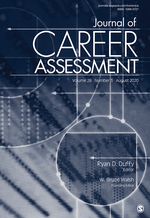
Abstract:
Full-time non-tenure track faculty, commonly referred to as NTT faculty, shoulder much of the teaching load within academic institutions. Self-determination theory (SDT) has shown promise as a conceptual frame for characterizing the relationship between environmental support factors and NTT faculty satisfaction. Full-time NTT faculty were sampled nationwide to investigate an SDT-based model positing basic psychological needs (i.e., volitional autonomy and relatedness) as mediators between six environmental support indices and NTT faculty satisfaction. Structural equation model results showed volitional autonomy and relatedness fully mediated the relationships between the six environmental supports and both indices of faculty satisfaction.Understanding the changing faculty workforce in higher education: A comparison of non-tenure track and tenure line experiences
Citation:

Abstract:
Non-tenure track faculty are a growing majority in American higher education, but research examining their work lives is limited. Moreover, the theoretical frameworks commonly used by scholars have been critiqued for reliance on ideologically charged assumptions. Using a conceptual model developed from Hackman and Oldham’s (1980) Job Characteristics Model (JCM) and prior research on faculty workplace experiences, this study considers the extent to which full-time non-tenure track and tenure line faculty share a professionalized approach to their jobs, working conditions, and how this is associated with their organizational commitment.
Satisfaction with resources, rewards, autonomy and feedback had a significant positive relationship with odds of organizational commitment for all faculty groups. Overall, the results suggest being removed from the tenure track is not associated with faculty viewing their jobs in a substantially different way than those in tenure line positions, which underscores the importance of conceptualizing full-time faculty work as an integrated whole.
Beyond Teaching and Research: Faculty Perceptions of Service Roles at Research Universities
Citation:
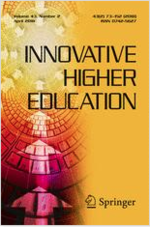
Abstract:
Faculty members in higher education institutions frequently have the responsibility of providing service activities to their institutions, professional societies, and external communities. This responsibility, however, generally carries little reward in the workplace and does not play a major role in promotion criteria. This study drew upon a sample of 4,400 research university faculty members surveyed through the Faculty Job Satisfaction Survey to explore their satisfaction with service roles by academic rank. Findings showed that mid-career faculty members at the associate professor rank were significantly less satisfied with their service functions, including workload, equity, work balance, recognition, and institutional support, when compared with both assistant and full professors.
Understanding the changing faculty workforce in higher education: A comparison of non-tenure track and tenure line experiences
Citation:

Abstract:
Non-tenure track faculty are a growing majority in American higher education, but research examining their work lives is limited. Moreover, the theoretical frameworks commonly used by scholars have been critiqued for reliance on ideologically charged assumptions. Using a conceptual model developed from Hackman and Oldham’s (1980) Job Characteristics Model (JCM) and prior research on faculty workplace experiences, this study considers the extent to which full-time non-tenure track and tenure line faculty share a professionalized approach to their jobs, working conditions, and how this is associated with their organizational commitment.
Satisfaction with resources, rewards, autonomy and feedback had a significant positive relationship with odds of organizational commitment for all faculty groups. Overall, the results suggest being removed from the tenure track is not associated with faculty viewing their jobs in a substantially different way than those in tenure line positions, which underscores the importance of conceptualizing full-time faculty work as an integrated whole.
Is the Tenure Process Fair? What Faculty Think
Citation:

Abstract:
A conceptual framework grounded on procedural justice theory was created to explain how judgments about the fairness of tenure decision-making evolved among faculty who had not yet undergone the review. The framework posits that faculty beliefs about fairness are influenced directly by their workplace experiences and both directly and indirectly by their socio-demographic characteristics.
Structural equation modeling was used to assess the proposed effects with data from 2,247 pre-tenure assistant professors at 21 research universities. The results substantiate the importance of perceived campus and department conditions.
Equitable treatment of junior faculty at the department level and effectiveness of feedback have the strongest relationships with beliefs about the equity of tenure decision-making. An individual’s sense of control during the process of constructing the tenure dossier predicts his or her judgments about the fairness of tenure reviews. Practical suggestions for campus leaders and implications for future research are discussed.
Gender Differences in Faculty Member Job Satisfaction: Equity Forestalled?
Citation:

Abstract:
Guided by Hagedorn’s (2000) theory of faculty job satisfaction, mindful of social and organizational structures of higher education, and acknowledging recent changes in the academic labor market, this study examines satisfaction for approximately 30,000 tenured and tenure-track faculty members in 100 US colleges and universities. Findings revealed similarity between female and male faculty members in some aspects of work satisfaction, but difference in other areas in which women reported lower satisfaction. Findings also revealed that perceptions of department fit, recognition, work role balance, and mentoring are more important to women faculty’s satisfaction than male peers. These findings have implications for policy and practice.
Beyond Teaching and Research: Faculty Perceptions of Service Roles at Research Universities
Citation:

Abstract:
Faculty members in higher education institutions frequently have the responsibility of providing service activities to their institutions, professional societies, and external communities. This responsibility, however, generally carries little reward in the workplace and does not play a major role in promotion criteria. This study drew upon a sample of 4,400 research university faculty members surveyed through the Faculty Job Satisfaction Survey to explore their satisfaction with service roles by academic rank. Findings showed that mid-career faculty members at the associate professor rank were significantly less satisfied with their service functions, including workload, equity, work balance, recognition, and institutional support, when compared with both assistant and full professors.
Understanding the changing faculty workforce in higher education: A comparison of non-tenure track and tenure line experiences
Citation:

Abstract:
Non-tenure track faculty are a growing majority in American higher education, but research examining their work lives is limited. Moreover, the theoretical frameworks commonly used by scholars have been critiqued for reliance on ideologically charged assumptions. Using a conceptual model developed from Hackman and Oldham’s (1980) Job Characteristics Model (JCM) and prior research on faculty workplace experiences, this study considers the extent to which full-time non-tenure track and tenure line faculty share a professionalized approach to their jobs, working conditions, and how this is associated with their organizational commitment.
Satisfaction with resources, rewards, autonomy and feedback had a significant positive relationship with odds of organizational commitment for all faculty groups. Overall, the results suggest being removed from the tenure track is not associated with faculty viewing their jobs in a substantially different way than those in tenure line positions, which underscores the importance of conceptualizing full-time faculty work as an integrated whole.
Personal and Institutional Predictors of Work-Life Balance among Women and Men Faculty of Color
Citation:
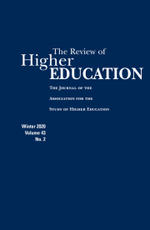
Abstract:
This study examines predictors of perceived work-life balance among women and men faculty of color using data from the Collaborative on Academic Careers in Higher Education (COACHE). Asian American men faculty report higher perceived work-life balance, while African American women faculty report lower perceived work-life balance as compared to other faculty members. Findings from multivariate analyses show that the strongest, most consistent positive predictor of perceived work-life balance was the faculty perception that the institution does what it can to make personal/family obligations and an academic career compatible. The findings offer important implications for institutional and departmental climate and policy.The possibility of promotion: How race and gender predict promotion clarity for associate professors
Citation:
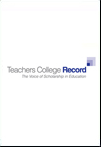
Abstract:
Past studies have strongly suggested that equity issues affect advancement through the academic pipeline. This study uses cross-institutional results from the 2010 through 2012 Faculty Job Satisfaction Surveys to offer analysis and potential solutions for the problem.
The study asks whether cultural taxation in the form of heavy service and advising—often associated with underrepresented minority faculty and women faculty—is a factor in advancement through the academic pipeline, and also examines the influence of ideal-worker norms and work/family demands on perceptions of promotion clarity. The analysis suggests that the factors associated with lack of clarity about promotion are more structural than individual.
Gender and Race Differences in Faculty Assessment of Tenure Clarity: The Influence of Departmental Relationships and Practices
Citation:

Abstract:
The authors look at how the intersection of gender and race influences pre-tenure faculty members’ perceptions of the clarity of tenure expectations. The authors also seek to identify potential predictors (assessment of mentoring, relationships with peers, feedback on progress toward tenure, and fairness in tenure decision making and evaluation) of perceptions of tenure clarity for four intersectionally defined groups, including historically underrepresented minority women (URMW). The authors use an intersectional perspective and the gendered and racialized organizations’ theoretical lens to interpret the results. The data set comes from the Faculty Job Satisfaction Survey. Findings show that compared with white men, URMW are less satisfied with their relationships with peers and with the fairness in the evaluation of their work. They are also less likely to agree that mentoring is effective, that tenure decisions are fair, and that messages about tenure are consistent.Browse Resources by Type
Prioritizing Responsibility as a New Provost
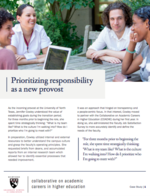
Abstract:
During her first year as provost at The University of North Texas, Jennifer Cowley made an effort to improve data transparency on campus. Alongside an internal platform to provide data to deans and department heads, she partnered with the Collaborative on Academic Careers in Higher Education to administer the Faculty Job Satisfaction Survey and develop a clear sense of faculty needs. Cowley found that the data, as well as collaborative relationships with new colleagues, helped her frame the critical conversations of her first year and identify key areas for change. The university plans to administer the survey every three years to track its progress.
Climate Change: Creating Space for Interdepartmental Problem Solving at Skidmore College
Citation:

Abstract:
Historically, academic departments at Skidmore College operated with large degrees of autonomy from one another. Groups rarely collaborated, which made it difficult for faculty and administrators to address climate and leadership challenges across divisions. In the absence of a centralized group equipped with the tools and resources needed to address these issues, Skidmore partnered with the Collaborative on Academic Careers in Higher Education (COACHE) and conducted the Faculty Job Satisfaction Survey to identify ways to improve departmental climates.
Using Skidmore’s survey results as a baseline for their first meeting, the team, which Skidmore leaders dubbed the ‘COACHE Collaborators’, worked together to identify three areas of departmental climate in need of attention: collegiality, diversity and inclusion, and work-life balance.
- «
- 2 of 2
Non-Tenure Track Faculty Satisfaction: A Self-Determination Model
Citation:

Abstract:
Full-time non-tenure track faculty, commonly referred to as NTT faculty, shoulder much of the teaching load within academic institutions. Self-determination theory (SDT) has shown promise as a conceptual frame for characterizing the relationship between environmental support factors and NTT faculty satisfaction. Full-time NTT faculty were sampled nationwide to investigate an SDT-based model positing basic psychological needs (i.e., volitional autonomy and relatedness) as mediators between six environmental support indices and NTT faculty satisfaction. Structural equation model results showed volitional autonomy and relatedness fully mediated the relationships between the six environmental supports and both indices of faculty satisfaction.Work–Family Balance and Tenure Reasonableness: Gender Differences in Faculty Assessment
Citation:
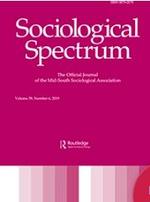
Abstract:
Perceptions of work–family balance and of the reasonableness of tenure expectations are key faculty retention factors. Using the Faculty Job Satisfaction Survey, which includes data from 2,438 tenure-track assistant professors, Rodica Lisnic, Anna Zajicek, and Brinck Kerr explore whether faculty assessment of departmental and institutional support for family influences their perceptions of the reasonableness of tenure expectations.
Results reveal that women are less likely than men to report tenure expectations as scholars are reasonable and that departments and institutions are supportive of family-work balance. Departmental support for family-work balance, caring for an ill family member, satisfaction with family-friendly policies, and workload have the strongest association with reasonableness. Satisfaction with family-friendly policies has a significant relationship with reasonableness of tenure expectations only for faculty with family care responsibilities. These results have implications for family-friendly policies and practices in academia.
Personal and Institutional Predictors of Work-Life Balance among Women and Men Faculty of Color
Citation:

Abstract:
This study examines predictors of perceived work-life balance among women and men faculty of color using data from the Collaborative on Academic Careers in Higher Education (COACHE). Asian American men faculty report higher perceived work-life balance, while African American women faculty report lower perceived work-life balance as compared to other faculty members. Findings from multivariate analyses show that the strongest, most consistent positive predictor of perceived work-life balance was the faculty perception that the institution does what it can to make personal/family obligations and an academic career compatible. The findings offer important implications for institutional and departmental climate and policy.Highlights Report 2008: Selected Results from the COACHE Tenure-Track Faculty Job Satisfaction Survey
Citation:
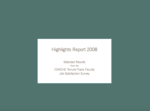
Abstract:
The Collaborative on Academic Careers in Higher Education provides academic leaders with peer data to monitor and improve work satisfaction among full-time, tenure-track faculty. More than 130 four-year colleges and universities have joined COACHE to enhance the quality of life for pre-tenure faculty and to enhance their ability to recruit, retain, and develop those faculty. The core element of COACHE is the Tenure-Track Faculty Job Satisfaction Survey. We now have job satisfaction data on over 8,000 pre-tenure faculty.
The COACHE Survey assesses faculty experiences in several areas: clarity and reasonableness of tenure processes and review; workload and support for teaching and research; importance and effectiveness of policies and practices; and climate, culture and collegiality on campus.
This COACHE Highlights Report complements the Institutional Report with an overview of results across all COACHE sites in the 2005-06, 2006-07, and 2007-08 cohorts. This year’s Report provides results disaggregated by race/ethnicity; by university control; and by gender.
COACHE Benchmark Exemplars, 2005-07
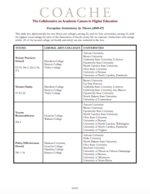
Abstract:
While the majority of junior faculty at America’s colleges and universities are satisfied at work, some institutions are doing particularly well in this regard. The Tenure-Track Faculty Job Satisfaction Survey, administered by the Collaborative on Academic Careers in Higher Education (COACHE) in 2005 and 2006, determined that some colleges and universities are “exemplary” on certain key dimensions of faculty work/life. The COACHE Survey considered the following categories in its assessment: tenure practices, clarity, and reasonableness; effectiveness of key policies (e.g., mentoring, childcare, and leaves); nature of work: teaching, research and support services; work and family balance; satisfaction with compensation; climate, culture, and collegiality; and global satisfaction.
“We are again recognizing those colleges and universities that are succeeding in their efforts to improve the quality of work/life for their junior faculty,” said Dr. Cathy Trower, COACHE Director. “By earning and maintaining the distinction of being a great place for new scholars to work, these exemplary institutions will be most able to attract and retain top academic talent in an increasingly competitive faculty labor market.”
- «
- 3 of 3
Faculty Departure and Retention at Small Liberal Arts Colleges
Citation:
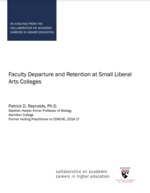
Abstract:
Voluntary faculty departures can often be prevented, but a lack of common exit procedures have hindered institutions’ ability to create proactive practices of faculty retention and instead harbor reactive tendencies with little positive outcome. Through interviews with 22 CAOs at liberal arts colleges, Patrick D. Reynolds, former Visiting Practitioner to COACHE, discovered partner employment and career choice were the two most prominent reasons for departures. Outliers also revealed that work and social environments, especially for faculty members of minority groups, often played a role in dissatisfaction.
Effective Academic Governance: Five Ingredients for CAOs and Faculty
Citation:
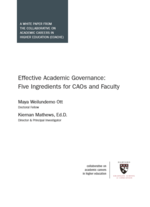
Abstract:
The COACHE research-practice partnership is designed to enact organizational change for the benefit of faculty and, by extension, the institution. But does every college's system of shared governance have what it takes to meet their own or, indeed, higher education’s most pressing challenges? This white paper looks beyond the rhetoric toward a more differentiated understanding of the ingredients of effective academic governance. Ott and Mathews offer a five-factor framework grounded in the literature, developed from interviews, and, now, tested in a survey of thousands of faculty. The report concludes with advice for assessing and fostering the qualities of “hard” and “soft” governance practices essential to sustainable change in the “real world” decision-making of committees, assemblies, senates, councils, and unions.Benchmark Best Practices: Tenure and Promotion
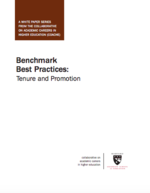
Abstract:
The COACHE surveys of college faculty produce data that are both salient to full-time college faculty and actionable by academic leaders. The survey items are aggregated into 20 benchmarks representing the general thrust of faculty satisfaction along key themes. This white paper discusses the themes of tenure policies, tenure clarity, and promotion.
Administrators and faculty alike acknowledge that, at most institutions, the bar to achieve tenure has risen over time. While it is impossible to eliminate anxiety from the minds of all pre-tenure faculty members, or the pressures exerted on their lives en route to tenure, academic leaders can improve the clarity of tenure policies and expectations without sacrificing rigor. And while the academy has recently improved many policies for assistant professors (e.g., research leave; stop-the-tenure-clock; part-time tenure-track options), it has done far less for associate professors. Ideas have emerged from COACHE research on tenured faculty.
- 1 of 5
- »

